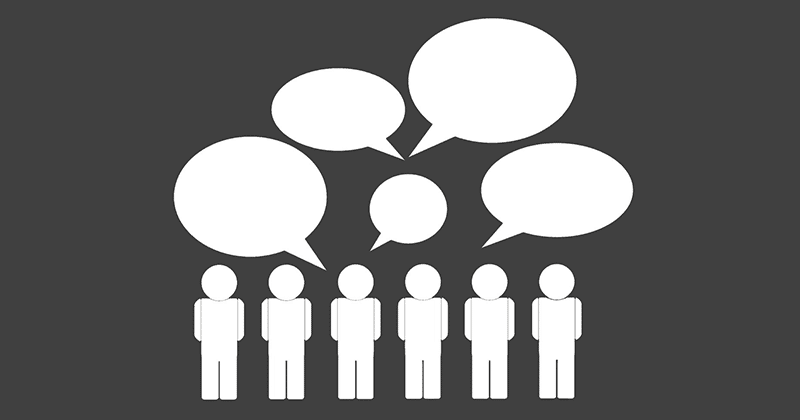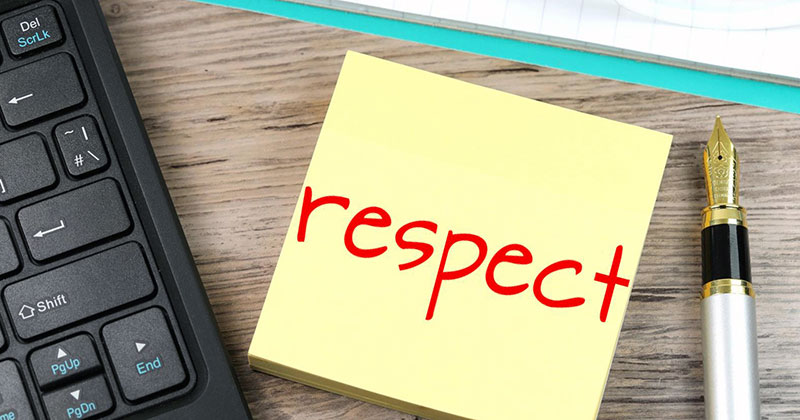Here are 14 great tips for student netiquette. The ideas come from university and college students.

We ran a short-essay competition to find the best ways of showing excellent online etiquette. The most insightful answers were used to form a set of rules or guidelines for internet manners.
How can I promote netiquette? Share this article or list of netiquette tips. Lead by example of course. And, if a discussion is getting off track, you can gently steer people in the right direction by acknowledging their points and asking questions.
The word netiquette is a combination of ’net’ (from internet) and ’etiquette’. It means respecting other users’ views and displaying courtesy when posting your views to online discussion groups.
~ BBC
1. Extend your good nature online
The digital world is an increasingly important part of our lives. We should be our best selves there too. The manners our parents taught us apply everywhere, including with online communication.
Do you think you’re generally a good person? Are you pleasant, polite and well-mannered? Most people would answer “Yes” or “Most of the time”. If someone says “Hello”, you say “Hi” back. If a stranger asks for directions, you try and tell them the best way to go.
But what about online discussions? Are you still that same considerate, nice person when you’re in an online forum including social media?
Think back to when you learned how to be a good human being. When you donated your hard-earned money, cut grass for your older neighbor, or sent a card to a friend who was having a bad week. Embody the rules of life that you’ve learned and are continuing to perfect, and use them online.
~ Amanda
2. Clarity is essential

Clear writing is needed to convey proper meaning online. Have you ever tried sarcasm or dry wit in an email? It seldom works. That’s because tone of voice and body language are lost in text-based communication.
Unfortunately, short texts have their limitations. You need to be accurate and very clear to avoid misunderstandings when writing online. Learn to write well as part of being a constructive online contributor.
Some online conversations descend into piles of useless text that fail to convey any meaningful information… use more specific language in text.
~ Katie Marie Lawles
3. Promote healthy discussion

To get the most out of online forums and social media sites, a useful netiquette guideline is to promote healthy discussion.
You can help your online community by posing questions, sharing experiences, providing positive feedback, asking follow-up questions, and referring to information sources. Being a positive contributor is better than being a critic, troll or other negative force.
Lead by example and the discussion will snowball into a useful web of ideas and answered questions.
~ Delaney Wright
4. Ignore inflammatory comments by trolls

It’s generally best to ignore trolls. These are internet users who try to bait other users into a reaction.
Trolls might be honest in what they’re saying, or they could be sarcastic or deliberately dishonest. You can tell a troll by the inflammatory nature of their statements. They want to stir up negative emotions and responses.
Responding to a troll is usually not a good move, even if your response is well argued and compelling. Save your time and energy for more positive interactions.
Ignore the troll as the troll is mainly looking for a response and attention so when it does not get it, it will be neutralized… how many people do you see arguing with themselves?
~ Brandon
5. Respect others as equals

Show a little respect and humility online.
Think – that idiot who wrote the opinion you completely disagree with is a human being. They have feelings and experiences. They may believe passionately in what they’re saying. And they may actually be right.
Even if you’re feeling dismissive or knowledgeable or whatever, inject respect into your writing. That’s just being fair to others.
Don’t be an e-jerk. You wouldn’t be rude in everyday conversations at home, at school or at work – so why change your shining personality when you’re online?
~ Coralie
6. You’re here to learn, not dictate
While we all like to think that our opinion matters, you’ll gain more from internet forums by approaching them as a learner.
When everyone is trying to express their view rather than hearing from others, forums become noisy, crowded with posts, and disjointed. A more polite and effective path is to adopt a listening mode. Read posts carefully, ask questions, and write something only if it offers value to the discussion.
Read to understand and not to respond. If you examine conversations that take place on any social media site or forum you choose to use, it’s apparent that a lot often gets lost in translation.
~ Chris
7. Remember, your words are permanent
Be careful with what you post in all online communications. Once it’s out there, you may not be able to get it back. Your online footprint is enduring.
Tattoos are seen as risky and dangerous because they’re permanent. Once the ink is injected, it’s pretty much there for the rest of your life. With the internet, what you write may be there for eternity.
Anything is possible with information that reaches the internet. It can go viral. It will be stored somewhere and may be findable through search. What you post can easily affect your relationships and career, if not now then possibly in the future. So always be at least a little cautious in your online interactions.
Your digital words are a record, in a permanent, unalterable ledger, forever bound to your online persona… never do anything online that you wouldn’t want your parents finding out about.
~ Liam Lambert
8. Be accurate with factual information
Misleading others is obviously a major breach of online etiquette. This is true even if it’s unintentional.
Check facts before providing information or giving advice. Provide sources. If you’re not an expert on a topic, maybe you shouldn’t be acting like you are.
Providing inaccurate information degrades the quality of online discussions. It can also have serious real-world consequences if it’s accepted and acted upon in some way. Everyone needs to take care when informing others.
I encountered top rated answers such as “international students get basically zero financial aid from American institutions”, which was obviously not true, as I later understood when I received my scholarship.
~ Jamal Amir
9. Pause before you post
It’s worth taking a moment to reflect before hitting the send button.
When you’re using a computer, you’re normally clicking, and scrolling and typing all over the place. Most things are done quickly. But one time when it’s important to slow down is when you’re about to post something online for all the world to see. Pause and reflect for a second. Are you truly comfortable with what you’re sending?
A good rule of thumb is asking yourself: would I be happy to let my Nan see what I have written? If not, perhaps it’s inappropriate.
~ Emily
10. Make your point in a nice way
Write in a way to get the kind of reaction you want. A little thoughtfulness, strategy and netiquette can go a long way in online discussions.
Your first draft of an online post is unlikely to be your best. Are you disagreeing with someone in a flippant way? Have you misinterpreted what they really meant? Will you put people off with the tone of your text.
Writing in a constructive way is a great habit to get into and a foundation of good netiquette. Your online communications will turn out much better.
Ask probing questions for clarity, avoid making assumptions or jumping to conclusions… If you disagree with someone, think “how can I express my disagreement without being disrespectful or antagonistic?”
~ Ashley
11. Use anonymity responsibly
While anonymity frees up online conversations, your ability to hide much of yourself shouldn’t be misused.
It’s a measure of your character that you conduct yourself with class all the time, even when you think no one will trace your online activity back to you personally.
Courteous online behavior helps others, improves your online experience and ultimately will help you become a better communicator. Conversely, bad behaviour catches up with people eventually. Trust in karma.
Anonymity is what distances users from their cyber counterparts, and has in turn stimulated the advent of cyber bullying.
~ Jill
12. Write like you’d speak
Write naturally as if you were talking to someone right in front of you. The text will be easier to understand and relate to.
While it’s helpful to put thought into what you write, you don’t want the product to appear labored. Dense and unnatural writing can be difficult to follow and could well be a conversation stopper. So try to sum up your thoughts in a fluent, natural way.
If you try to force it, your message may come across as shrewd or too formal… read aloud what you are writing so you can determine how the person reading it may feel, react, or respond.
~ Jeremy Marroquin
13. Good writing is good manners
When posting text for others to see, try to write well. While rushing may save you a little time, think of the poor reader. They don’t want to waste time trying to read something unclear or incomprehensible.
And remember that many people might see your work. In a busy student forum, it could be dozens or hundreds of students. On a popular website or for a viral post, it could be many thousands. All these readers are inconvenienced by poor writing. Good writing is, therefore, an essential part of internet etiquette.
Use language with skill. Urgency and laziness in typing or formulating communications is still plain old bad manners, and polite conversation is impossible with an inebriate :-).
~ Catherine Lockley
AI can quickly catch grammar mistakes and suggest improvements. But always review suggestions critically. Don’t rely solely on AI, as it may miss context and nuances that only a human can understand.
14. Use internet resources ethically
Online study resources should be used to support learning, not replace it.
When you take unethical shortcuts, such as downloading assignment answers or hiring an essay writer, you deny yourself learning opportunities. While there may be a short-term gain, there are also long term costs. If you graduate, it will be with a weaker skill base.
By accessing and studying from completed homework and tests without a professor’s permission, you are cheating.
~ Tryssa de Ruyter
Use AI in a responsible way that promotes your development. For example, don’t generate entire assignments or essays with ChatGPT. Instead, use AI tools to add to your understanding, clarify concepts, and provide feedback on your work to help you grow academically.

Jamal Amir
Be Informative, Don’t Misinform
Human beings have a tendency to do outrageous things when behind the curtain of anonymity.
When researching scholarships, I was completely discouraged by online forums like Quora and College Confidential when they told me it was impossible for an international student to get a scholarship. In my quest, I encountered top rated answers such as “international students get basically zero financial aid from American institutions”, which was obviously not true, as I later understood when I received my scholarship from NYU. However, the online forum answer had succeeded in captivating me in perfect grief until then.
To address this problem, here are my netiquette rules and guidelines:
1. If you are not a professional in a field in real life, don’t pretend to be on the internet.
2. If you don’t have anything encouraging to say, don’t say anything.
3. Never abuse anonymity by saying or doing things you would not say or do in real life, be it hurtful or kind.
4. Do not promote a false persona under your real name.
5. If you can’t provide citation for your grand claim, it probably isn’t true.
6. Provide citation for grand claims.
7. Be polite in your speech.
Amanda
Follow the Same Rules as Life
I text my long-distance best friend more than I talk to her in person. I email my boss daily updates, but haven’t seen him in weeks. I’m reading and responding to comments from you lovely people.
Communicating through a text-based format happens, for most, every single day. While this lets us connect with people who we may not be able to interact with in person, sometimes the internet seems like a fantasy world behind the screen of your shiny new computer. In reality, the internet is an extension of our lives. It’s important to our social interactions, our schooling, our leisure time.
So think back to when you learned how to be a good human being. When you donated your hard-earned money, cut grass for your older neighbor, or sent a card to a friend who was having a bad week. Embody the rules of life that you’ve learned and are continuing to perfect, and use them online. Show compassion, love, and kindness. Listen to others and actually care. “Don’t be an e-jerk” as Coralie so nicely put it. Make mum proud and be a good human online and off.
Tryssa de Ruyter
Cheating: A Netiquette No-no
Like many students, the internet is my first stop when I write research papers or study. With online libraries and flash cards at my fingertips, it is often easy to forget academic ethics when so much information is available to you. One such netiquette mistake is utilizing online “learning networks” that provide completed homework and tests.
A favorite study aide among many college students is “Course Hero,” one such “learning network.” The problem with using these kinds of sites is that by accessing and studying from completed homework and tests without a professor’s permission, you are cheating. Both uploading and accessing this kind of information is poor netiquette online and poor ethics in the real world. The solution to this problem is simple: ask your professor what will and will not be considered cheating. Most professors will consider any use of “Course Hero” or similar sites as cheating, which actually makes it easier to adhere to proper ethics and netiquette because you can now just avoid entire websites completely.
Delaney Wright
Participation is key
Integrating the views and perspectives of peers enables students to thoroughly examine an issue or topic of discussion. In answering the questions of their peers, students consolidate their own knowledge. Students who communicate well and post in a polite manner are more likely to receive insights and answers from other students. It is very important that students focus on positive and helpful responses during discussions to maximize the benefits of online discussion. Participation is the key in regards to netiquette. By participating in an online discussion in a polite and respectful manner, peers will lead by example and the discussion will snowball into a useful web of ideas and answered questions.
Brandon
Ignore Trolls
In the world of Netiquette, trolling can be seen as a double edged sword as our world becomes more politically correct and people become forced to disguise their true feelings and intentions. While most would agree that trolling is very inappropriate and damaging, it can also be seen as insightful and a blunt reflection of a portion of the general population’s true feelings under the cloak of anonymity which allows them to be free from persecution. Trolling should be viewed on a spectrum that can range from lighthearted teasing, sarcasm and satire to abuse and hate speech. To defend against the troll, would only exacerbate an argument and might distract people from the original content that they were trying to watch/learn about. The easiest thing to do, is to ignore the troll as the troll is mainly looking for a response and attention so when it does not get it, it will be neutralized. In other words, they will stop when they see that no one is acknowledging their rants/sharp comments. I mean how many people do you see arguing with themselves? Don’t get upset when you see a troll, just realize that that’s what they want and can’t get.
Coralie
Don’t be an e-jerk
The internet can be a world of unique possibilities – endless hours of cat videos, the latest dank memes, how-to instructions for everything from origami cranes to building your own spaceship. For some people the internet, can be cruel and isolating. Following some basic netiquette guidelines means that we continue contributing to the cat-filled internet that we know and love, while making the online world safe and fun for everyone.
Don’t be an e-jerk. You wouldn’t be rude in everyday conversations at home, at school or at work – so why change your shining personality when you’re online? Nettiquette is less about how to write the perfect corporate email or the perfect time to post on Instagram, and more about the common sense issues of respect, inclusiveness and kindness. When you’re online don’t engage with bully’s, keep encouraging diversity, always spellcheck and most importantly, use your common sense.
Aretha Franklin said it best in 1969 with, R-E-S-P-E-C-T (sing that in your head, I dare you). If we value the feedback and opinions of others and spell things correctly, the internet would be a much better place for all students!
Chris
The Concept of Understanding
Students throughout various levels of learning are often required to take part in online forums to engage in discussions with classmates. With access to these boards comes rules that everyone should look to abide by. In my experience, there’s one practice that could be exercised more often.
Read to understand and not to respond. If you examine conversations that take place on any social media site or forum you choose to use, it’s apparent that a lot often gets lost in translation. What should be simple exchanges between two people turns into an argument due to a lack of clarification from either side. If you sense a misunderstanding, don’t hesitate to ask questions or explain your thoughts as clearly as possible.
Liam Lambert
Online Interactions Matter
The internet is a great tool for unlocking education. I have had the pleasure of studying online courses, conducting discourse through online forums and talking with fellow classmates, across the globe. By working remotely, we remove our inhibitions, our thoughts are freer and we can truly grasp our education. As long as we use netiquette, the cyber equivalent of manners.
With every new-found freedom, however, comes new found harms. The internet is permanent, your digital words are a record, in a permanent, unalterable ledger, forever bound to your online persona. Whilst the classroom is now ethereal, do not leave your manners and respect behind, your internet colleagues are just as real as ever. The loss of facial expression, body language, and interactions in one’s voice mean that communication is somewhat harder now. This means that arguments and debate require even greater attention than in face-to-face scenarios, avoid personal attacks, disrespecting other and ensure your etiquette and common courtesy are intact.
Whilst understanding what makes for good netiquette is important, understanding how to deal with another’s poor etiquette is equally useful. As my father advised me, ‘never do anything online that you wouldn’t want your parents finding out about.’
Emily
Think Twice
Netiquette guidelines tend to be based around simply thinking about others. We have the chance to get so much work and study done online, and it seems such a shame to ruin it by upsetting or angering someone through our mistakes or bad manners.
I would really recommend thinking twice about posting absolutely anything. A good rule of thumb is asking yourself: would I be happy to let my Nan see what I have written? If not, perhaps it is inappropriate, particularly in an academic context. I try to avoid writing negative responses at all; I would rather my view on a matter not be heard than post something that could be misconstrued. But if I have something critical to say, then I make sure that it sounds critical, but not downright negative.
Also, a quick word about group discussions. I would definitely recommend establishing a set time for everyone to be on the forum to talk at once, instead of going on when they feel like it and having length delays between messages. Without everyone on together, you can power through your work and be really productive!
Ashley
Think Before You Speak
In a society where we can post our every thought and communicate with a series of acronyms and emoticons, it is easy to see how communication standards can quickly evolve. In an academic setting however, the accuracy of your communication is much more important. In an online setting, we don’t have the conveniences provided by in-person interaction such as non-verbal communication, inflection, tone, etc. For this reason, careless messages can quickly translate the wrong way.
Keep your responses brief, discarding unnecessary information that can create confusion. Do your best to understand and decode what others intend to say, taking culture and life experience into consideration. Ask probing questions for clarity, avoid making assumptions or jumping to conclusions and use plain, simple English when speaking.
If you disagree with someone, think “how can I express my disagreement without being disrespectful or antagonistic?”
Being able to respectfully disagree, share ideas and information and communicate with a variety of people is a valuable life skill to develop and maintain. As a communications major, I am just beginning to unravel the complexities of human communication, but when it comes to Netiquette, it all boils down to thinking before you speak.
Jill
Pros and Cons of Anonymity
I strongly believe that one of the internet’s greatest assets, its sense of anonymity, plays a parallel role as its greatest pitfall.
It is this sense of anonymity that can: connect people based on intellectual compatibility; foster discussion about a range of niche issues (such as physical and mental health problems with attached stigma) that online users often fear speaking about in ‘real life’; and provide individuals with a platform for speaking that is not undermined by subsidiary factors such as age or appearance.
In spite of these positives, this same sense of online anonymity is what distances users from their cyber counterparts, and has in turn stimulated the advent of cyber bullying. Additionally, perceived anonymity is a crucial factor in many instances of online ethical violations, such as academic misconduct.
Although this is a fairly complex issue, let’s not be afraid of the internet – take advantage of its many opportunities! Just as in real life, it is vital that we are aware of traps that await us, and maintain a sense of self-integrity. It’s our prerogative to exhibit the kind of behaviour that we value in others – let’s prove we’re up to the task.
Jeremy Marroquin
Write Like You’d Speak
When writing on the net, I think you should always try to be more like yourself. Recognize you are actually speaking with another person, instead of writing. This will help the flow of your conversation and it will seem natural. If you try to force it your message may come across as shrewd or too formal. Also remember who you are speaking to as to this will give a better idea of how and what you will say. And before pressing that post or send button, read aloud what you are writing so you can determine of how the person reading it may feel, react, or respond to your message.
Catherine Lockley
Courtesy
Author Stephen Pinker tells us that the word “courtesy” comes from the first known etiquette handbooks -those written to teach Knights & Nobles how to conduct themselves in the court of the King. Now, in the vast and ever expanding kingdom of the World Wide Web, the size of our audience has grown but the basic premise of “courtesy” should always remain: Think of the feelings of others first.
Despite our use of the internet as a personal tool, it’s not all about slavishly maximising your personal convenience.
All the classic, old-fashioned rules your Grandmother insisted upon still apply.
In order to avoid breaches of ‘netiquette’, remember: Know the language well. Use language with skill. Urgency and laziness in typing or formulating communications is still plain old bad manners, and polite conversation is impossible with an inebriate :-).
Pinker, S (2007). The Stuff of Thought: Language as a Window into Human Nature. New York, NY. Viking.
Katie Marie Lawles
Yeah Right!
Netiquette is an ill-defined set of rules, mostly based on common sense, that attempt to make online communication clear and effective. We know good netiquette when we read it, and very poor netiquette can be blatantly obvious, but on occasion it can be hard to identify why some online conversations descend into piles of useless text that fail to convey any meaningful information.
Of course, in an academic environment, discourse should always be respectful and courteous. However textual communication has a few more traps for the inexperienced.
Much of our verbal discourse includes cues that do not translate well into text, such as the tone of voice used to indicate sarcasm, the shoulder shrug indicating a lack of certainty in a statement, or a declarative sentence turned into a question with an uplift in tone at the end.
The easiest way to avoid these potential pitfalls is to use more specific language in text, for example: explaining fully the intent of a sentence, adding explicit qualifying language to indicate the level of certainty the writer has in their statement, and avoiding sarcasm at all times.